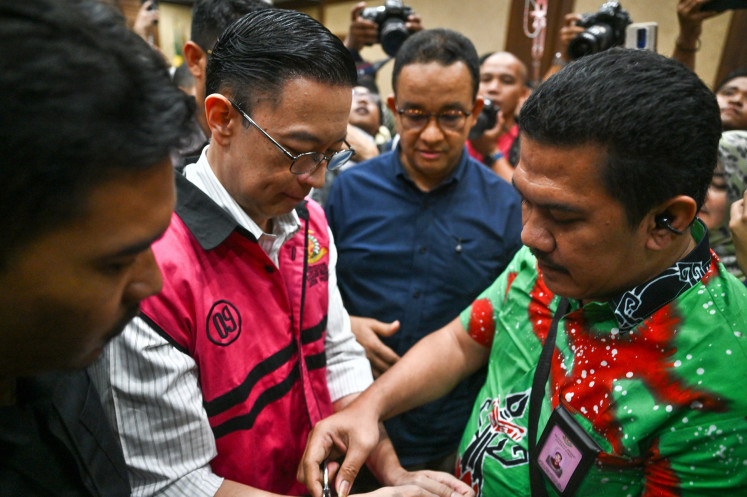Popular Reads
Top Results
Can't find what you're looking for?
View all search resultsPopular Reads
Top Results
Can't find what you're looking for?
View all search resultsPirated e-books up for grab in Indonesia
Indonesia has taken measures — though many question their feasibility — to crack down on pornography and illegal music downloads on the web, but so far it has no plan to pull millions of pirated e-books from the digital shelves
Change text size
Gift Premium Articles
to Anyone
I
/span>Indonesia has taken measures — though many question their feasibility — to crack down on pornography and illegal music downloads on the web, but so far it has no plan to pull millions of pirated e-books from the digital shelves.
Bambang Santoso, an employee of a private firm in Bandung, West Java, is an avid reader of books on films and music. He said if he cannot find the books he wants at nearby bookstores, he turns to the Internet and usually finds them there.
He never checks whether his downloaded books are copyrighted or not. “I don’t really understand about copyrights for digital books. I only know when I need a book and I need it fast. I only use the information from e-books for reference, and I don’t circulate them to make a profit.”
E-books have been around for several years, but were previously only readable on laptops or personal computers, the Amazon Kindle and dedicated e-book readers. The advent of Apple’s iPad and other tablet devices has sparked a trend toward reading e-books.
The copyright issue regarding e-books has yet to be addressed by the government, unlike copyrights on downloaded music. In July, the Communications and Information Ministry closed 20 illegal music sharing websites because they violated the law on information technology and intellectual property rights.
With many universities in Indonesia establishing digital libraries, the e-book copyright issue will become important. One of the universities in question is the University of Indonesia (UI), which subscribes to 80 networks worldwide, including Harvard University, and allocates Rp 6 billion per year toward developing the library.
Luky Wijayanti, UI’s head librarian, said that all e-book collections in the library were guaranteed to be licensed as they were provided by trusted sources. “If the e-books are free, and not licensed, we will collate them and put them on the intranet. Those e-books can only be accessed by UI students or visitors coming to the library,” she said.
In the United States, the University of Michigan and four other universities are facing a lawsuit from several authors’ guilds and individual authors because their collected online repository contained as many as 7 million copyright-protected books, which the guilds contest were scanned without authorization. The claimants maintain that books from dozens of countries have been illegally digitized, including China; Switzerland; Lebanon; France; India; Indonesia; Japan; Mexico and the United Kingdom,
Spokesman for the Communications and Information Ministry, Gatot S. Dewa Broto, said that the government would work in accordance with the law on intellectual property rights and the Information and Electronic Transaction Law. “Just like we protect music from being downloaded freely, we will also protect e-books. However, we can’t monitor everything. We must wait for reports from authors and/or readers,” he said.
The Information and Electronic Transaction Law stipulates that anyone who transmits or distributes information owned by other people can face imprisonment and fines.
Gatot said that, so far, his ministry had yet to receive any reports; he guessed people with any complaints went straight to the police.
“We are aware that this could become a trend, so we have prepared the two laws to protect people,” he said.










